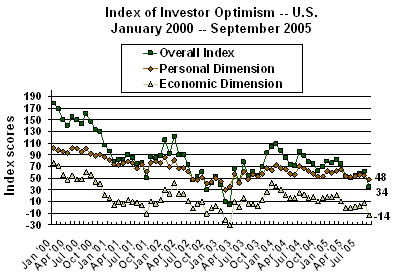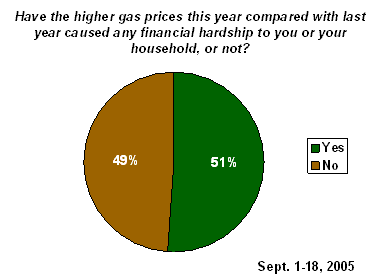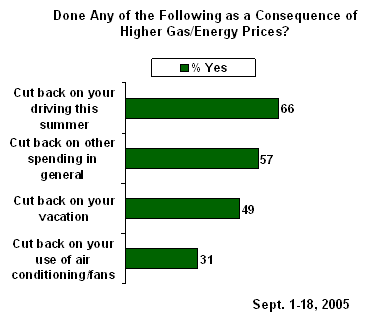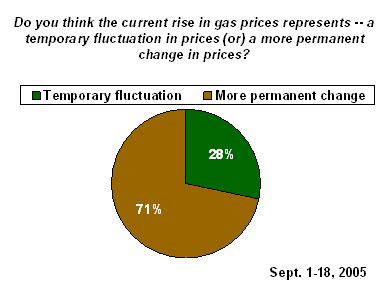|
Gallup Poll: Investors turn pessimistic
about the future direction of the U.S. economy
Gallup Hurricanes, Energy Prices, Investor Optimism Suggest Bleak Holiday Sales by Dennis Jacobe September 26, 2005 Consumers with money to spend should take early advantage of discounting this holiday season PRINCETON, NJ -- Last Wednesday, Ernst & Young said it expected this year's November-December retail sales to increase, but at a rate below that of last year. The same day, the National Retail Federation said it expects November-December retail sales to show their slowest growth since 2002. At the same time, Wal-Mart said it plans to be very aggressive with its pricing this holiday season, as it was during back-to-school. Significantly, these projections were not made in response to the Fed's 11th consecutive increase in short-term interest rates, but in reaction to the surge in energy prices in the aftermath of Hurricane Katrina. While the impact of Hurricane Rita appears to be much more moderate than expected, the higher heating oil and natural gas prices expected this winter are likely to worsen the situation. Unfortunately, the same is true as far as investor and consumer confidence are concerned. Investor optimism plunged in September from its already low levels in response to Katrina, according to the UBS/Gallup Index of Investor Optimism. Post-Katrina investor pessimism suggests that holiday sales expectations, although less optimistic than in previous years, may still be too high. Rita probably means there will be additional downward revisions in holiday sales expectations in the not-too-distant future. Investor Optimism Drops Sharply
The Personal Dimension is at 48 -- down from 54 in August and also at its lowest level of 2005. The Economic Dimension is at -14 -- down from 7 in August, suggesting that investors as a whole have gone from neutral to pessimistic about the future direction of the U.S. economy. Gas Prices Causing Financial Hardship
Investors Are Cutting Back in Response
A Permanent Change in Gas Prices?
Implications for the U.S. Economy While announcing its most recent interest rate increase last week, the Federal Open Market Committee largely dismissed the impact of Katrina on the economy as temporary: "While these unfortunate developments have increased uncertainty about near-term economic performance, it is the Committee's view that they do not pose a more persistent threat. Rather, monetary policy accommodation, coupled with robust underlying growth in productivity, is providing ongoing support to economic activity." Evidently, the Fed believes that Katrina and the increase in gas prices it stimulated will create a temporary economic disruption. However, the government-assisted rebuilding that will follow in three to six months will ensure that this is only a temporary phenomenon. Of course, this essentially ignores the impact of investor-consumer psychology on the economy. Gallup economic data have shown that consumer-investor confidence has been low for many months. The data have also shown that a significant part of the U.S. consumer population has not benefited from the economic recovery of the past couple of years to the same degree as the economic averages might suggest. For those who have suffered financial hardship over the past year from increasing energy prices, the post-Katrina surge in gas prices at the pump is a devastating blow. Even before Hurricane Rita appeared on the scene, the Fed may have seriously underestimated the significance of $3-a-gallon gas on the average American consumer. Add the expected surge in heating oil and natural gas prices at the consumer level this winter, and the cumulative psychological impact might not only produce another "soft patch" but something even worse. Holiday Sales Outlook Post-Katrina, more than half of all U.S. investors say they are cutting back on other expenditures in response to rising gas and energy prices. Because investors represent roughly the top 40% of U.S. consumers in terms of financial resources, the percentage of the population as a whole that is cutting back on other spending must be much greater. Factor in Rita, and every retailer -- with the possible exception of those serving wealthy consumers almost exclusively -- can anticipate much slower sales and significantly less profit this holiday season. Given this general expectation among retailers, it is logical to assume significant discounting early in the season as each retailer tries to garner a bigger piece of the shrinking sales pie. At the same time, most retailers are less likely than normal to stock up, given the likelihood of fierce price competition and a decline in holiday sales. They are also less likely to hire additional seasonal help than in the recent past. While the resulting November-December economic "soft patch" may be temporary, as the Fed suggests, it is also going to be very painful for many retailers and those who supply them. On the other hand, the approaching holiday sales period may be a good one for consumers with money to spend. There are likely to be deep price discounts earlier this year than in the past. However, it may be wise for consumers to take advantage of the early sales, because reduced inventories are likely to significantly reduce the selection of goods available toward the end of the holiday season. Survey Methods Results for the Index of Investor Optimism poll are based on telephone interviews with 802 investors, aged 18 and older, conducted Sept. 1-18, 2005. For results based on the total sample of investors, one can say with 95% confidence that the maximum margin of sampling error is ±4 percentage points. In addition to sampling error, question wording and practical difficulties in conducting surveys can introduce error or bias into the findings of public opinion polls. Commentary: |
|



